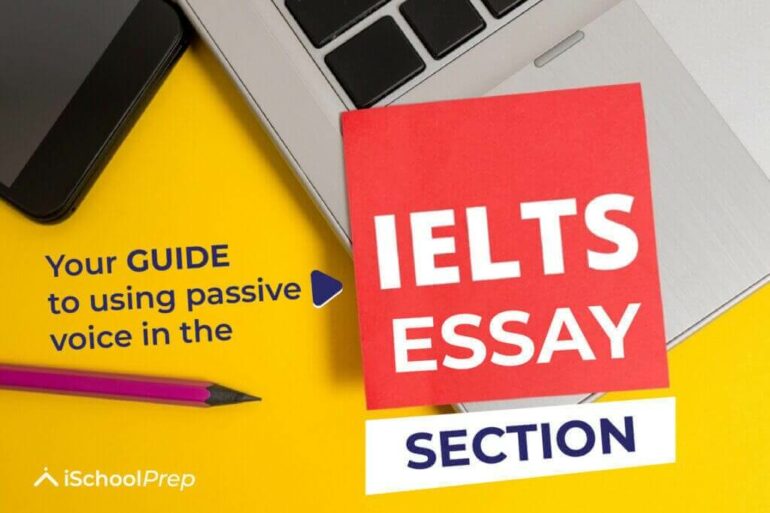Table of Contents
Aspiring IELTS students often get confused about how to use passive voice in IELTS essays and writing tasks. If you ask the same question to get others’ opinions, they may recommend not to use it because the sentence structure can get a bit cumbersome, which is true.
Nevertheless, using passive voice in an essay can give fruitful results, so you should consider using passive voice while writing an IELTS essay. In this article, we will discuss passive voice and where you should use it while writing an IELTS essay.
Definition of passive voice?
Before we delve into the passive voice rules of IELTS essay writing first, let us understand what passive voice is. Passive voice is a form of a verb where the focus is on the person or object experiencing the action instead of the object or individual carrying out the action.
For example,
Active voice: Ruskin Bond wrote The Cherry Tree.
Passive voice: The Cherry Tree was written by Ruskin Bond.
In the above example, you can see that the sentence written in the passive voice has become structurally the exact opposite of the first sentence or active voice sentence. In the first sentence, the person (Ruskin Bond) writing the book was at the start or was regarded as the subject, but in the second sentence, it is at the end. In the second sentence, we have focused on The Cherry Tree, a book written by the author.
Why use passive voice in a sentence?
In the previous example, where we defined the passive voice, we mentioned the book (The Cherry Tree) at the beginning of the sentence. This implies that the book is more important in the sentence.
A lot of times, we use passive voice to mention artworks, books, literary pieces, movies, music, and different kinds of inventions. In some cases, the creator is given the utmost importance; in others, the creation gets the limelight.
For example,
Active voice: The Wright brothers invented the airplane.
Passive voice: The airplane was invented by the Wright brothers.
While using the passive voice, in some cases, we don’t know or want to mention who performed the action.
For example,
Shila was brutally murdered last night. (We don’t know who was the culprit behind the murder.)
Alex was caught stealing the necklace. (Who caught him, it is not mentioned.)
When to use passive voice in IELTS essay writing?
A troublesome and ambiguous field for the students appearing for the IELTS examination is that they don’t know when and how to utilize passive voice during the exam correctly. In some cases, using the passive voice is necessary to increase the accuracy of the sentence, while in other scenarios, it is not needed. Due to this, a lot of students end up writing inaccurate IELTS essays.
If you are unsure about the usage of passive voice in a sentence, you need to start reviewing the basic passive voice rules and match them up with the IELTS examples. It will not only boost your general skill regarding the English language but also help you complete the practical tasks of the IELTS.
Use of passive voice in the IELTS writing task 1
While you go through task 1 of the IELTS exam, you will come across several tasks emphasizing the modifications, advancements, and phases instead of the quantities, values, and percentages.
For a straightforward example, you can go through the maps and plans. You will also be able to come across the same when creating the process diagram. An ideal IELTS report should concentrate on the information that is readily available.
If you utilize passive voice while writing the examples, your report will become precise and focused on the subject, and all the unnecessary details will be excluded. Passive voice can also be an excellent method of summarizing the writing work.
Use of passive voice in the IELTS writing task 2

In writing task 2 of IELTS, the passive voice is used to express the opinions of other individuals. This implies that you can use the passive voice to write discussion essays and to write down others’ opinions on a subject before expressing your own views; Also, remember that, while giving your own opinion, use an active voice.
Since the active voice is significantly more widespread in comparison to the passive voice in the English language, it should be your preferred choice during the IELTS exam. Nevertheless, in some cases, the usage of passive voice becomes more appropriate and noteworthy, which is why you need to use it as well (whenever and wherever applicable).
Another reason to learn passive voice is that it can help you in your listening and reading tasks during the IELTS exam. More importantly, this will help you understand how you can use it during the construction of a sentence. In both task 1 and task 2 of the IELTS exam, you will need to understand and may have to use the passive voice.
Read more: Top 10 Rules of Nouns to Improve Your English!
Key takeaways
- There is a lot of confusion among IELTS students when it comes to the usage of passive voice in writing tasks and essays, which is why it is important to know their appropriate usage before appearing for the exam.
- If you are stating or writing others’ opinions, then use passive voice to get a higher score.
- While expressing your own opinion, use an active voice.
Read next: Nail your university-specific SOP with these 5 incredible tips!
FAQs
Question 1 – Can we use passive voice in IELTS writing task 1?
Ans – Yes, you are allowed to use passive voice in the IELTS writing task 1, but only when it is appropriate or applicable. Although in writing task 1, the usage of the passive voice will be incredibly limited. In case you receive a diagram, you need to remember that they are a combination of active and passive voices.
Question 2 – How do you fix passive voice in an essay?
Ans – Here is how you can fix passive voice:
- First, you need to find out who or what is carrying out the action, and it will be described by the verb of the sentence.
- Identify who or what is actually performing the action described by the verb in the sentence.
- Remove the verb be and convert the past participle to a properly constructed verb.
- Use the subject of the previous sentence and transform it into a direct object.
Question 3 – Can I correct myself in IELTS speaking?
Ans – Yes, in case you have made an error while conveying your message while speaking, you can correct yourself. There are no marks for meaning during the IELTS speaking test, and if you correct yourself without disrupting your flow, then everything will be fine.
Question 4 – What can I write instead of a passive voice?
Ans – Instead of writing using passive voice, focus on answering the question with active voice during the IELTS test. Sometimes using passive voice can be troublesome because it requires additional words and can be ambiguous.






